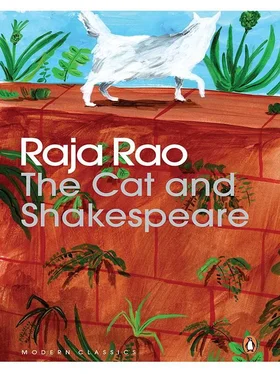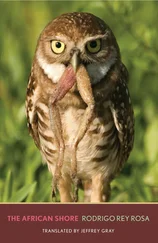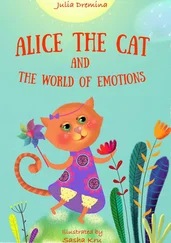People hereabouts have a superstition. Govindan Nair’s family is called the Valauthoor family (they fought in some wars and had some vague privileges), and they are supposed to have one virtue: they never touch anything that does not turn gold. Yet they die all of them in miserable circumstances. Some in distant parts and of vague fevers, others of murder or of debauchery, but one and all end badly. Only after the seventh generation will the lineage be pure again. It is a curse of one of the elders who had been allowed to die in starvation, while the others were gay with women. This generation will be the last, says the tradition. The rotten chapter will be wiped off the pages of history. Man will turn innocent again.
So the arrest did not come as a surprise. The death of Shridhar was in fact like a precursor of this event. You know you will suffer, so suffering comes and tells you. Whether you sold a calf (or was it pneumonia?), you must play fair. If you trick destiny, destiny tricks you. If you say: I am all right; I am almighty; I am Govindan Nair; I can weigh children in scales, make wayward women fall at my feet — Destiny chooses the exact fact for your redemption. Rama Iyer comes and takes you away to police custody. He is the mildest of police inspectors. But if he has a warrant of arrest, will he stop because he hears Shridhar has died some four weeks ago? Was the calf sold before or after? The question with the law is a question of dates. If you did not murder the moment you murdered, you might never have murdered. How strange it all is. One moment before, you did not commit murder. One while after, you have. What happened between the two? The knife came into the picture. Yes, the knife.
For everybody in Ration Shop No. 66 knew this was all fake. First of all, a man who plays with children so — Kunni Krishna Menon’s family will bear you witness to this — could not have sold false permits. How could he starve children? If you starved mothers, you starved children. If you starved fathers, you starved mothers from having children. So you could not starve anybody. Starvation comes only through a man that could, like the British Government, say, I am me, may I alone live. Can you live alone? I am an island. I am king, etc., etc.
The real story of the arrest is this: One morning — it was a month or two after this house had been bought — Govindan Nair went to his office. He was a little late, being held by some friends for a smoke. Then he went in, up and in, and he saw everybody so busy, their papers under their noses, he felt ashamed to be late. Fortunately there were very few people in the ration shop below, and this gave him comfort. Though there was no real connection between the ration office and the ration shop, yet somehow they worked together, like a husband and wife whose stars are different, but from marriage and progeny they go through to the final bamboo processionals and the funeral anniversaries. Thus the two were tied together.
Not finding many persons in the shop below meant the office was running well. There was no overwork. The boss was in a good humour. The fresh ration cards had come in from the printers. Besides, perhaps that rascal Velayudhan Nair’s cold is better. Thus he will have started verifying the new ration card numbers. Sometimes the printers deliberately repeated a number and sold the duplicate to hotel servants for ten rupees.
If not, tell me how are the hotels to thrive? Once again, sir, it’s a matter of starvation.
So Govindan Nair went in, and what he saw was indeed strange to behold. In a cage of white steel wiring, in fact in a big rat trap, was a large cat, and the cat and the cage were on Govindan Nair’s table. His table was totally cleaned up.
In the next room his boss was sneezing away as usual with his handkerchief in his hand — he had put too much snuff into his nose. It comes from living very near the temple, and every Brahmin gives you a bit of snuff: ‘I wash the divine vehicles for the Dussera festivals, and here is some snuff for you.’ ‘I go to pour curry powder for the sacred viands, here’s a “pinch”, Bhoothalinga Iyer.’ ‘I am going to wash the second dawn service vessels, and here’s “a sniff’, Mr Ration Superintendent.’
And so on, up to the bus stop and there is always Vishwanath Iyer, who gives you some when you get on. All the office-going people get in together and snuff together, and by the time the bus has crossed the railway overbridge and passed the office, you have had three pinches. You have to wipe the front of your coat to remove every trace of this dark trituration. It looks disreputable going to the office with a garland of dark powder. Then you go in, and going in you see the cat, you see the cage. Once in your own office, you hear the meow-meow. You say: ‘John, what is it?’ John the third clerk laughs and hides his face in the palm of his hand. ‘Abraham, Abraham!’ shouts Bhoothalinga Iyer. Abraham comes in. He too has snuff on his nose. His beard is ever like Jesus Christ’s. And he says: ‘John has played a trick on Govindan Nair.’ ‘What trick? A ration office and such tricks. Where are the rats?’ ‘There are no rats, sir. It’s a cat.’ ‘A cat, when there is no rat? But I thought I saw a rat trap.’ ‘Yes, sir, but the hook has been removed, and there’s a cat.’ For Bhoothalinga Iyer rats existed and not cats. Ration shops have rats. That is true. And you must have rat traps. But this meow-meow business — Bhoothalinga Iyer was sure Govindan Nair, that clever rascal (all Nairs have enough Brahmin blood to be clever, Bhoothalinga Iyer used to say, but not enough to understand the truth; truth is the privilege of the Brahmin) — yes, yes, cleverness gone elsewhere always produces these disasters. You have, for example, a cat on your table and in a rat cage.
‘John!’ he called.
The clerk called, John came in. John had some money in the Imperial Bank, so he thought himself infallible, he said: ‘Yes, sir, what is the matter?’
‘What is this nonsense about the cat?’
By now Shivaraman, Syed Sahib and Muthukrishna Pillay had joined him at the door.
‘Yes, what is it?’
‘Govindan Nair always talks of a mother cat. It carries the kitten by the scruff of its neck. That is why he is so carefree. He says, “Learn the way of the kitten. Then you’re saved. Allow the mother cat, sir, to carry you,”’ said John, and suppressed his resentful laughter.
Bhoothalinga Iyer was a Brahmin. For him a cat, a marjaram, was a pariah animal. It was sly, unclean, unfaithful. It was evil to see a cat first thing in the morning. It was evil if the wretched creature crossed from right to left as you went to office. You had to go back home and visit the sanctuary, and beg the gods to bless you. Then you could catch the bus. Also, cats’ hair, if it fell into your milk, was worse than gall. It made you vomit blood. So altogether the cat was not a creature to be thought about. A rat, yes, it was the vehicle of Lord Ganesha himself. In every temple you could see a Ganesha and under every Ganesha there was his vehicle, the rat, like Lord Subramanya had the peacock, or Shiva the bull. But the cat, which god ever rode a cat? Nobody did — so it was improper, unholy, beyond thought. What is beyond thought cannot be thought about-it is evil to the temple street. Evil has a name, a text and a commentary. Can you speak without text? You could therefore never say you can prove the cat is holy. Nobody, no god, rode on it. ‘Chee-Chee!’ sneezed Bhoothalinga Iyer, contemplating the cat.
Poocha is what a cat is called in Malayalam. But Bhoothalinga Iyer always used the Sanskrit word marjaram. It carried its own condemnation. It needed no more explanations. It made you talk less. Abraham understood. John did not.
Читать дальше












